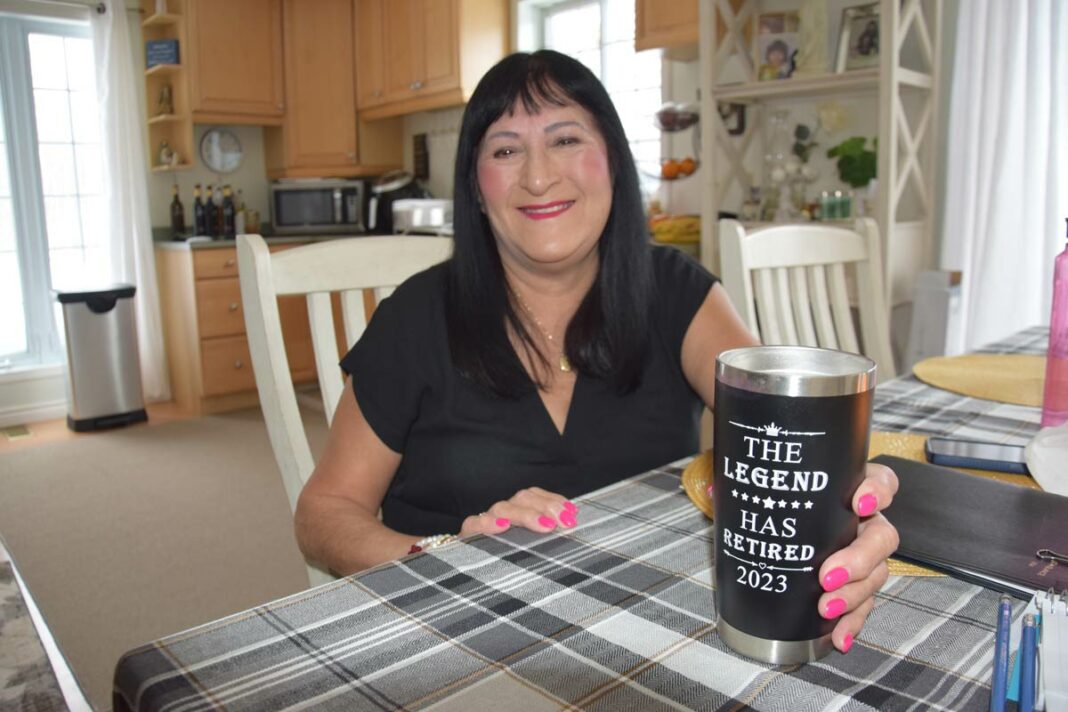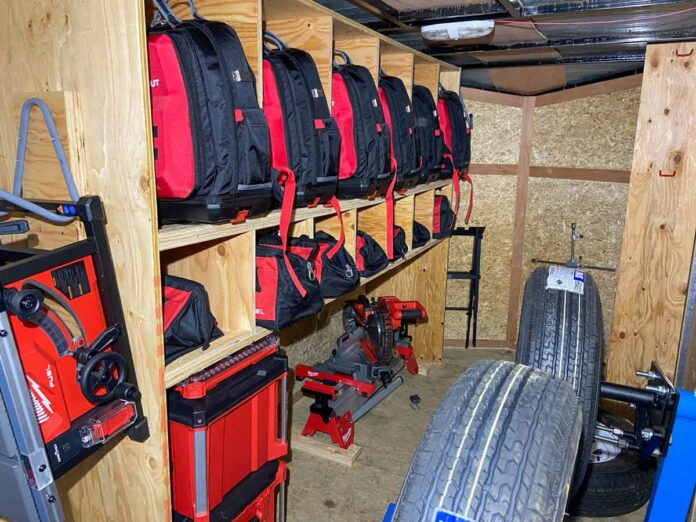Hazel Recollet reflects on over half-century of service to Indigenous communities
M’CHIGEENG—Hazel Recollet recalls her climb of the stairs into the United Chiefs and Councils of Mnidoo Mnising (UCCMM) (back then it was called United Chiefs and Councils of Manitoulin) to take up her new job as CEO after leaving Indian Affairs.
“I looked down at the creaking steps (at the organization’s original location) and thought to myself ‘what have I gotten myself into?” she laughed. Coming from the relatively cash-flush world of a federal ministry into the world of underfunded Indigenous governance at the time was more than a bit of culture shock.
After 21 years of her navigation, the entrance into the UCCMM offices provide solid footing.
“The first thing I was told when I started was ‘we have no money in the bank,’” recalled Ms. Recollet. “I thought, ‘that can’t be right.’” A quick check of the UCCMM finances soon set her straight—there really was no money in the bank.
Ms. Recollet rolled up her sleeves and set to work, but it wasn’t always pleasant at the start.
“We changed some things around and one of the departments wasn’t very happy with me,” she said. “But a year later we had money in the bank.”
If there is one thing that Ms. Recollet is most proud of, however, it wouldn’t be about the money or the huge list of accomplishments she has piloted into fruition during her tenure. It is the staff and the working atmosphere she helped foster during her time at the head of the organization.
“I have always given credit to the staff,” she said, “and they were always there to help me. Any time I asked them to help me with something the answer was always ‘Sure, anytime.’”
Ms. Recollet was adamant that anything that was accomplished during her tenure, it was because of the team she had backing her up.
“It has been a wonderful, sometimes chaotic, sometimes downright horrible, sometimes challenging, but a memorable 20 years that I spent working with the UCCMM,” she said during her retirement speech. “I don’t really want to say working, because I had a really enjoyable time with UCCMM.”
Ms. Recollet recalled response to a question from then-UCCMM Tribal Chair Pat Madahbee at her job interview for the position. “He asked me what I considered to be the most important thing that I had done. I don’t think Pat was really expecting what I said.”
Her reply? “The greatest accomplishment that I have done was to have raised my two daughters as a single parent and that Tiffany and Charlene turned out to be exemplary young ladies.”
In that answer, Mr. Madahbee knew they had found their new CEO.
“I had the opportunity to work with Hazel for the past 20 years,” said UCCMM Tribal Chair and Chief of Aundeck Omni Kaning Patsy Corbiere. “Hazel led with a strong integrity for the betterment of the UCCMM First Nations. She was instrumental in building and enhancing the UCCMM programs and services and worked tirelessly on the Northland Power/Mnidoo Mnising windmill project. Hazel will be sorely missed by the UCCMM Tribal Council Chiefs and Council and most importantly, program managers and staff. She will be missed for her strong leadership style, her kind-hearted spirit and her dedication to serving the Anishinabek UCCMM First Nations. We wish her all the best in her retirement and most importantly, good health for many years to come.”
“I worked with Hazel many years ago at the Union of Ontario Indians and I knew her work ethic,” recalled former UCCMM Tribal Chair Patrick Madahbee. “When we were looking for a new executive director for the tribal council I knew she was retiring from the federal government so I approached her to see if she would consider coming to work for us. She accepted and did a good job all those years. We have been fortunate on Manitoulin to have the longevity and stability of people like Hazel. I wish her all the best in retirement, I can tell you from personal experience it is great.”
Ms. Recollet started working at Indian Affairs at the tender age of 18. She recalled that it was M’Chigeeng Educator Melvina Corbiere baa who had stopped her on the road one day and asked if Ms. Recollet would be willing to go work with Indian Affairs. She found herself in an entry level clerical position on the Island but soon proved that she was no pushover.
Her boss at Indian Affairs, the late Vern Robinson, asked her to do something she was not comfortable with. “Being a bold little Indian I said ‘no,’” she recalled. “Vern said ‘that’s insubordination!’ I said ‘Oh, that’s alright.’ It all went quiet; nobody said a word.”
As soon as she could, Ms. Recollet retreated to her desk and pulled out a dictionary and looked up insubordination. “I almost fell to the floor after I read what it meant,” she recalled. It is telling that there were no repercussions to her show of backbone. It was only a short while later that Ms. Recollet found herself working in the Ottawa office and then the Toronto office. She would go on to work for Indian Affairs for the next 26 years.
The move to Toronto proved to be momentous. She wound up working as executive secretary for the Anishinaabek Nation (then referred to as the Union of Ontario Indians) as well, and life settled into a regular routine.
Working for Indian Affairs had some interesting moments, recalled Ms. Recollet. Given the opportunity for a promotion, she demonstrated one of the qualities that would serve her in good stead through life—loyalty.
Marriage, the birth of her first daughter (Tiffany) led to a move to Sudbury, the last stop on her Indian Affairs career. It was during that time that she rolled up her sleeves and dug into everything she could about the relationship between Indian Affairs and First Nations. “I made it my mission to excel in all areas of their programming, education, capital, operations and maintenance, social assistance and economic development etc.”
Promotions came through hard work, even though her then-boss told her “I wasn’t going to amount to anything because I was an Indian.”
It was in May 2002 that Ms. Recollet bid adieu to Indian Affairs and took up the helm at UCCMM. She would continue in that role for the next 21 years without a break in service. “I believe I am the longest-standing UCCMM CEO, this has been one of my proudest moments,” she said. “The total amount of time that I have dedicated to Indigenous people, First Nations and bands is 52 years.” Over a half-century of service.
Ms. Recollet was adamant that nothing that has been accomplished at UCCMM during her tenure happened without her team of program managers and board of directors.
One of the first of those things was getting rid of those creaking stairs and moving into a new building. “Moving out of the M’Chigeeng museum,” she laughed.
The list goes on. The creation of a social navigator (now part of the UCCMM Anishnaabe Police Services), the Gwekwaadziwin alcohol and drug treatment program, the child services mandating of Kina Gbezhgomi Protection Services, a comprehensive community plan, uncounted capital planning studies, the creation of Mnidoo Mnising Power, UCCM Anishnaabe Police Services funding agreements, management services for the Ojibwe Cultural Foundation, helping guide land claims and the associated Manitoulin Project, expanding community justice programming as well as affiliates such as Noojmowin Teg.
“But if I didn’t have a supportive, knowledgeable and caring staff I wouldn’t have accomplished as much as I have,” she said.
Much of the success of a leader can be found in their level of empathy, she said. “You must put yourself in their shoes and understand their feelings, thoughts and experiences,” said Ms. Recollet. The open-door concept has to be more than a trendy phrase.
Ms. Recollet was effusive in her gratitude to the UCCMM board of directors, especially current tribal chair Aundeck Omni Kaning Chief Patsy Corbiere, “for providing me with guidance, knowledge, support, understanding and friendship throughout the good times and the bad.”
As for the future, Ms. Recollet said that she sees capacity building as one of the main challenges facing the UCCMM organization as it moves into the future under a new hand.





